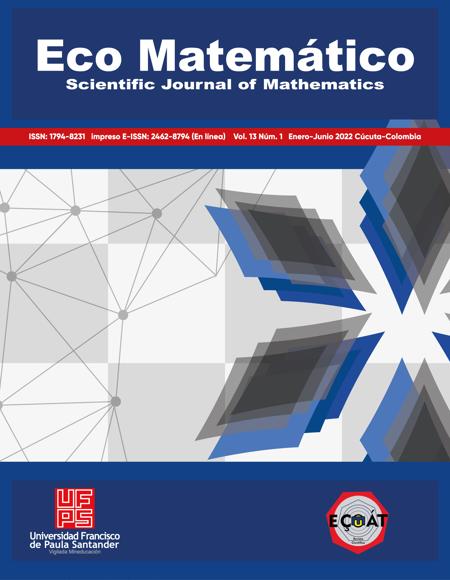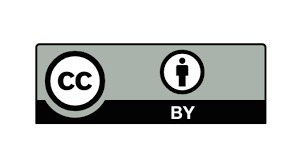Deconstruction of the logarithmic function: Teacher training
Deconstrucción de la función logarítmica: formación de profesores
Main Article Content
The teaching and learning of the logarithmic function have been a purpose of study in mathematics education, both teachers and students find the understanding of this concept challenging. This has been detected or analyzed through interviews and work proposals in the classroom, among others. In this case, we consider the need for interventions that directly involve teachers. The ideas from the didactics of mathematics regarding the Basic Models by which underlying hypothesis are taken up, that considers the unique approach to teaching the logarithmic function as the inverse of the exponential function is not enough and it can contribute to challenges in learning. In this project when approaching teacher training, a Hypothetical Learning Path is elaborated, so that teachers can deconstruct this concept in their initial or continuing training process. Taking advantage of the results of inquiries in mathematics education, documentary research with phenomenological perspective is performed and, qualitative data are processed with an interpretative and descriptive analysis using the concept of Hypothetical Learning Path. For the deconstruction of the concept of the Hypothetical Path, there are objectives, tasks, questions, and experiences proposed; and the practicing or training teachers are required to characterize these functions through various mathematical elements. Based on the study and analysis of the publications of the academic community, the proposals and findings are selected and used in part or in full allows the teacher to delve through the different Basic Models and at the same time researchers indirectly embedded in the role of curators in education.
Downloads
Article Details
Bocanegra, L., Galeano, O. and Huerfano, H. (2013). Diseño de una herramienta didáctica para la formación del profesor de matemáticas utilizando elementos históricos de lo logarítmico y lo exponencial [Tesis de maestría, Universidad Pedagógica Nacional]. Repositorio Universidad Pedagógica Nacional. http://hdl.handle.net/20.500.12209/199
Cabrera, L. and Cantoral, R. (2013). La deconstrucción del conocimiento matemático: un medio para el análisis del desarrollo profesional del profesor. En R. Flores (Ed), Acta Latinoamericana de Matemática Educativa 26, 1595-1603. México: Comité Latinoamericano de Matemática Educativa. https://core.ac.uk/download/pdf/20482853.pdf
Cano, M. and García, D. (2016). Resignificando la función logarítmica una mirada desde la covariación y el enfoque socioepistemológico: una propuesta didáctica [Tesis de pregrado, Universidad Pedagógica Nacional]. Repositorio Universidad Pedagógica Nacional]. http://hdl.handle.net/20.500.12209/2254
Dennis, D. and Confrey, J. (1997). Drawing Logarithmic Curves with Geometer’s Sketchpad: A Method Inspired by Historical Sources, J. King and D. Schattechneider edited, Geometry Turned on, MAA, pp. 147- 156. http://quadrivium.info/mathhistory/Log.pdf
Garzón, J. (2016). La curaduría de contenido digital: un espacio de encuentro entre el saber disciplinar y pedagógico del educador [Tesis de maestría, Universidad de Antioquia]. Repositorio Universidad de Antioquia. https://bibliotecadigital.udea.edu.co/bitstream/10495/5209/1/JuanGarzon_2016_curaduriacontenidodigital.pdf
Getenet, S. and Beswick, K. (2014). Using ICT in teaching a specific mathematics concept: Graphs of logarithmic functions. In Proceedings of the 38th Conference of the International Group for the Psychology of Mathematics Education and the 36th Conference of the North American Chapter of the Psychology of Mathematics Education (pp. 153-160). http://www.pme38.com/
González, M. T. and Vargas, J. (2007). Segmentos de la historia: la función logarítmica. Matemática: Enseñanza Universitaria, 15(2), pp. 129-144. https://www.redalyc.org/pdf/468/46815210.pdf
Juárez, D., Torres, C. A. and Herrera, L.E. (2017). Las posibilidades educativas de la curación de contenidos: una revisión de literatura. Apertura (Guadalajara, Jal.), 9(2), pp. 116-131. https://doi.org/10.32870/ap.v9n2.1046 DOI: https://doi.org/10.32870/Ap.v9n2.1046
Kenney, R. and Kastberg, S. (2013). Links in learning logarithms. Australian Senior Mathematics Journal, 27(1), pp. 12. https://eric.ed.gov/?id=EJ1093384
Koştur, M. and Ayşenur, Y. (2017). Technology support for learning exponential and logarithmic functions. Ihlara Eğitim Araştırmaları Dergisi, Ihead. 2(2), pp. 50-68. http://hdl.handle.net/20.500.12424/2391034
Krieger, P. (2004). La deconstrucción de Jacques Derrida (1930-2004). Anales del Instituto de Investigaciones Estéticas, 26(84), pp. 179-188. Recuperado el 06 de septiembre de 2020. Disponible en: http://www.scielo.org.mx/scielo.php?script=sci_arttext&pid=S0185-12762004000100009&lng=es&tlng=es. DOI: https://doi.org/10.22201/iie.18703062e.2004.84.2179
Maloney, A. and Confrey, J. (2010). The construction, refinement, and early validation of the equipartitioning learning trajectory. Paper presented at the 9th International Conference of the Learning Sciences, Chicago. https://repository.isls.org/bitstream/1/2780/1/968-975.pdf
Posada S. (2013). Curaduría de contenidos digitales: un potencial para la educación y el aprendizaje. Virtual Educa 2013. Recuperado de: http://www.virtualeduca.info/ponencias2013/428/MarioPosadaPonenicaVE2013.doc.
Sfard, A. (1991). On the dual nature of mathematical conceptions: Reflections on processes and objects as different sides of the same coin. Educational Studies in Mathematics, 22, pp. 1–36. https://doi.org/10.1007/BF00302715 DOI: https://doi.org/10.1007/BF00302715
Sfard, A. (2008). Thinking as communicating: Human development, the growth of discourses and mathematizing. New York, NY: Cambridge University Press. https://doi.org/10.1017/CBO9780511499944 DOI: https://doi.org/10.1017/CBO9780511499944
Simon, M. (1995). Reconstructing mathematics pedagogy from a constructivist perspective. Journal for Research in Mathematics Education, 26(2), pp.114-145. https://doi.org/10.2307/749205 DOI: https://doi.org/10.5951/jresematheduc.26.2.0114
Vargas, J., Pérez, E. and González, M. T. (2011). El logaritmo: ¿Cómo animar un punto que relacione una progresión geométrica y una aritmética? En P. Perry (Ed.), Memorias del 20º Encuentro de Geometría y sus Aplicaciones (pp. 129-138). Bogotá, Colombia: Universidad Pedagógica Nacional. (PDF) El Logaritmo ¿Cómo animar un punto que relacione un progresión geométrica y una aritmética? | Mario H. Pérez - Academia.edu
Vargas, J. Jaimes, L.A., Chaves, R.F. (2018). Modelación y escala logarítmica: retos del profesor de precálculo en la universidad. En: Diario de Campo La experiencia: requisito para la visibilidad, la divulgación y el impacto de la investigación. Sello Editorial Universidad Colegio Mayor de Cundinamarca. Pp. 171-189.
Vargas, J. (2019). Enseñanza de la función exponencial. Investigación y práctica en el aula: de la Primaria al Precálculo en la Universidad. Bogotá: Sello Editorial Universidad Colegio Mayor de Cundinamarca. https://www.researchgate.net/publication/332212646_Ensenanza_de_la_Funcion_Exponencial_Investigacion_y_Practica_en_el_aula_De_la_Basica_al_precalculo_en_la_Universidad
Vargas, J. (2020). Una revisión de la literatura en enseñanza y aprendizaje de los logaritmos (2000 – 2013): historia y epistemología. En: Tomo XXIV coleccion internacional de investigación. Red Iberoamericana de Pedagogia. pp. 89 – 129. https://doi.org/10.36260/rbr.v9i8.1041 DOI: https://doi.org/10.36260/rbr.v9i8.1041
Vargas, N. and Vargas, J. (2019). Arte y Matemáticas. El caso de regularidades y patrones en la cultura precolombina para la enseñanza en precálculo. En: Champaign, Illinois, EE.UU. por Common Ground Research Networks, NFP. pp. 58. DOI:10.13140/RG.2.2.26459.59682
Vargas Hernández, J., Vargas Hernández, N. ., & Cáceres García, M. J. . (2020). El profesor y el arte precolombino: creación e interdisciplinariedad en las prácticas matemáticas de identificación de regularidades y patrones. Revista Boletín Redipe, 9(12), 320–334. https://doi.org/10.36260/rbr.v9i12.1158 DOI: https://doi.org/10.36260/rbr.v9i12.1158
Vargas, J., González, M.T. and Vargas, N. (2020). Modelación de mecanismos y propiedades de la función logarítmicas. En: Diario de Campo Diario de Campo. Resultados del desarrollo de métodos y técnicas de investigación, Sello Editorial Universidad Colegio Mayor de Cundinamarca, 10(1), pp. 251-275. (PDF) Una modelación de mecanismos de construcción y las propiedades de los logaritmos (researchgate.net)
Vargas, J. y González, M. T. (en prensa). La enseñanza de la función logarítmica como inversa de la función exponencial: un estudio de caso. En: Investigación en educación matemática: homenaje a los profesores Pablo Flores e Isidoro Segovia / coord. por José Antonio Fernández-Plaza, José Luis Lupiáñez Gómez, Antonio J. Moreno Verdejo, Rafael Ramírez Uclés; Pablo Flores Martínez (hom.), Isidoro Segovia Alex. 9, págs. 351- 368.
Vom Hofe, R. and Blum, W. (2016). “Grundvorstellungen” as a category of subject-matter didactics. Journal für Mathematik-Didaktik, 37(Suppl. 1), pp. 225–254. https://doi.org/10.1007/s13138-016-0107-3 DOI: https://doi.org/10.1007/s13138-016-0107-3
Weber, C. (2016). Making logarithms accessible - operational and structural basic models for logarithms. Journal für Mathematik-Didaktik, 37(Suppl. 1), pp. 69-98. DOI:10.1007/S13138-016-0104-6 DOI: https://doi.org/10.1007/s13138-016-0104-6
Weber, C. (2017). Graphing logarithmic functions: Multiple interpretations of logarithms as a basis for understanding. En T. Douley y G. Gueudet (Eds.) Proceedings of the Tenth Congress of the European Society for Research in Mathematics Education CERME10. (pp. 537–544). DCU Institute of Education y ERME Graphing logarithmic functions: Multiple interpretations of logarithms (doczz.net)
Weber, K. (2002). Students’ understanding of exponential and logarithmic functions. En D. Mewborn, P. Sztajn, D. White, H. Wiegel, R. Bryant y K. Nooney (Eds.), Proceedings of the 24th annual meeting of the North American Chapter of the International Group for the Psychology of Mathematics Education. Columbus, USA: ERIC Clearinghouse for Science, Mathematics, and Environmental Educatio. https://www.semanticscholar.org/paper/Students%27-Understanding-of-Exponential-and-Weber/58ec726365a0a58914403d22048d13ddc36a367d







